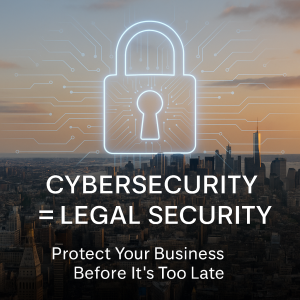Cybersecurity for New York Businesses: Why It’s a Legal Obligation, Not Just an IT Issue

Cybersecurity: Why Business Owners Need to Treat It Like a Legal Obligation, Not Just an IT Issue
What You Might Not Know
Even if your business never suffers a cyberattack, you can still be fined for not having adequate cybersecurity safeguards. Under New York’s SHIELD Act (General Business Law §899-bb), businesses are legally required to implement “reasonable” data security measures. Failure to do so — even without an actual breach — can trigger investigations, fines, and lawsuits.
So yes, cybersecurity isn’t just an IT checklist — it’s compliance. And noncompliance can cost you just as much as a hack.
Cybersecurity Is a Legal and Financial Risk — Not Just a Tech Issue
Most business owners think cybersecurity belongs to the IT department. In truth, it belongs in the boardroom — right next to your risk and compliance policies.
When sensitive customer, financial, or employee data is exposed, regulators and lawyers will ask what you did to prevent it, not what your firewall vendor promised.
1. Human Error Causes 60% of Breaches
Phishing, credential theft, and fake emails are the most common entry points for cybercriminals.
Legal takeaway: If you handle personal or financial data, you’re required to train employees and enforce multi-factor authentication. Failure to do so could be seen as negligence under New York data protection laws.
2. Nearly Half of Small Businesses Have Already Been Attacked
According to multiple industry surveys, 46% of small and mid-sized companies report experiencing a cyberattack.
Legal takeaway: Once client data is compromised, you may face breach-of-contract suits, negligence claims, and regulatory action. Courts don’t care about your intent — they care about your controls.
3. The Average Data Breach Costs $4.4 Million
Legal fees, regulatory fines, notification costs, and insurance deductibles add up fast.
Legal takeaway: Cyber insurance is no longer optional. Many insurers now deny claims if your business cannot show written cybersecurity policies or incident-response plans.
4. One Click Can Violate the SHIELD Act
New York’s Stop Hacks and Improve Electronic Data Security Act requires businesses to protect personal information — and to notify affected parties when it’s exposed.
Legal takeaway: A single employee mistake (like clicking a phishing link) can legally trigger notification requirements, penalties, and even consumer class actions.
5. Ransomware Is Exploding Among Small Businesses
Ransomware attacks have surged by more than 30% year over year. Hackers target small firms because defenses are weaker and recovery plans are rare.
Legal takeaway: Without an incident-response protocol reviewed by legal counsel, paying a ransom could violate sanctions laws or breach your cyber insurance policy.
6. AI Tools Are Creating New Legal Risks
Many businesses unknowingly upload confidential data into public AI tools.
Legal takeaway: Doing so may breach client agreements or privacy policies. Before your team uses AI, ensure your contracts allow it — or risk exposing trade secrets.
Cybersecurity Compliance = Business Survival
Failing to maintain proper cybersecurity isn’t just risky — it’s legally indefensible.
Courts have already ruled that ignoring industry security standards can amount to gross negligence. Regulators are watching, insurers are tightening coverage, and clients expect written proof of compliance.
If your cybersecurity and data-handling policies haven’t been updated in the last year, you’re already behind.
How Our Law Firm Helps
At Ronald S. Cook, P.C., we work with New York businesses to review, document, and strengthen cybersecurity compliance measures.
Our firm has experience helping companies:
-
Draft and implement legally compliant cybersecurity and data-retention policies.
-
Review contracts for liability exposure and vendor security clauses.
-
Coordinate with IT providers to align technical protections with legal requirements.
-
Prepare breach-response protocols that minimize penalties and litigation risks.
Protect Your Business Before It’s Too Late
Cybersecurity isn’t just about avoiding hackers — it’s about avoiding lawsuits.
One overlooked email, unpatched system, or missing training log can turn into a compliance nightmare.
Don’t wait for regulators, insurers, or opposing counsel to find your weak spot.
Contact Ronald S. Cook, P.C. today to schedule a confidential consultation and ensure your cybersecurity program stands up to legal scrutiny.
📞 Call (888) 275-2620 to request your consultation.
CLICK HERE to contact the law firm.
CLICK HERE for information regarding other books published by Attorney Ronald S. Cook.


